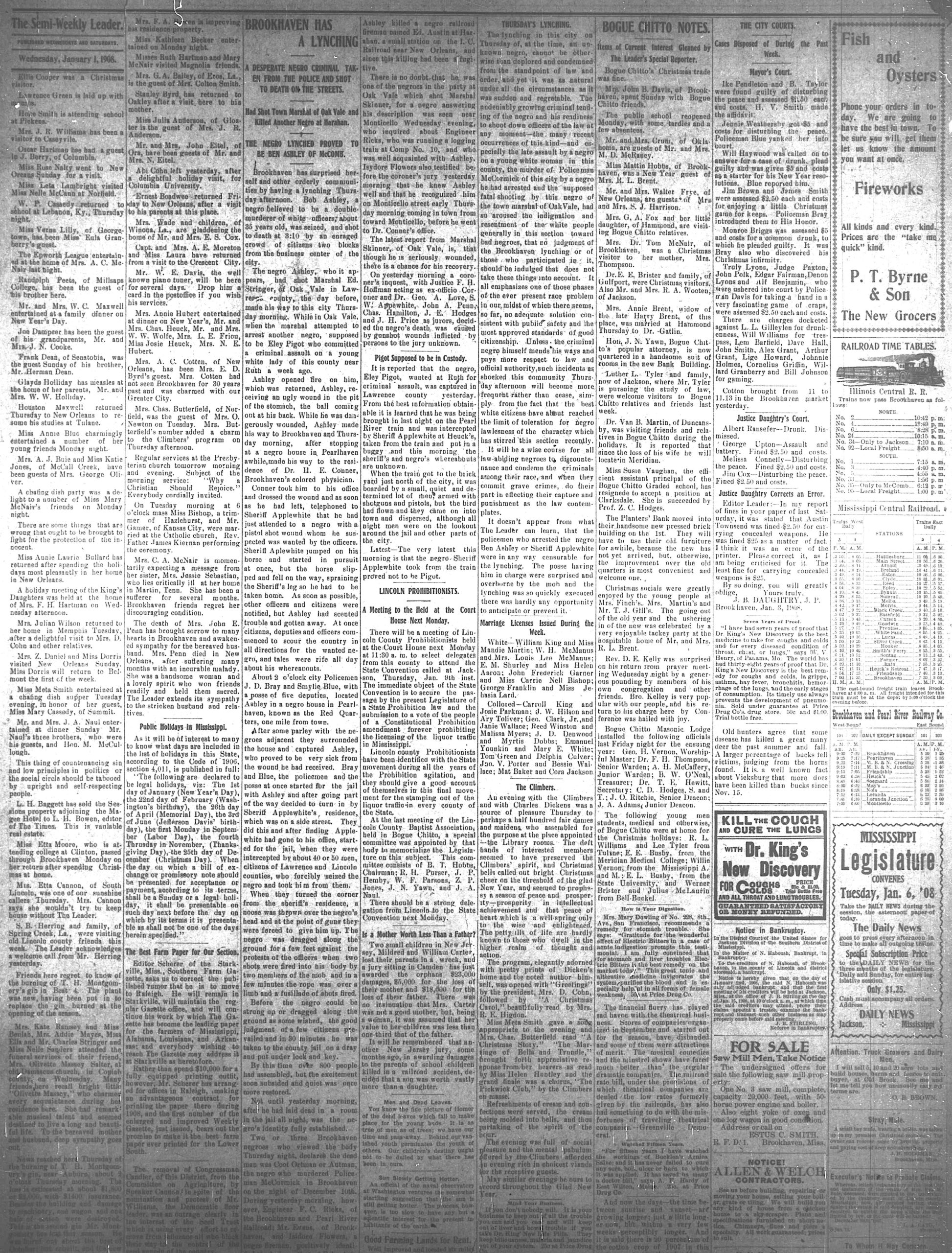Bob (or Ben) Ashley: Formerly "Unknown Negro"
Share
Explore Our Galleries
Newest Exhibit
Breaking News!
Today's news and culture by Black and other reporters in the Black and mainstream media.
Ways to Support ABHM?
Murdered in: Brookhaven, Mississippi | Jan 2, 1908
From information provided by David West, a visitor to ABHM's Virtual Museum from Brookhaven MS
Many of the victims whose deaths by lynching are commemorated in this Memorial are listed as "Unknown Negroes," because this is the way the newspapers of the time reported this common abomination. Sometimes, as in the case of Mr. Ashley, the victim's identity became known only later and was subsequently reported in the newspaper.
This museum listed Mr. Ashley as Unknown until today, when we received a note and photo from a museum visitor, Mr. David West. He was curious when he saw that there had been a lynching in his hometown of Brookhaven, Mississippi, and decided to research it. We are grateful to Mr. West for finding and sending us a photo of a newspaper page giving the victim's name (as both Ben and Bob Ashley in different paragraphs).
Normally we do not post about the deaths of lynching victims. The emphasis in our Memorial is on their lives and humanity, not on the horrifying details of their murders.
However, because Mr. West sent a copy of an original artifact – a detailed contemporaneous news article – and because Mr. Ashley's killing exemplifies a typical lynching, we decided to include his murder as an example.
This lynching was officially ruled to have been committed "at the hands of persons unknown," as were many in very small towns like Brookhaven ––where everyone knew everyone else –– as well as in big cities. This extra-legal (e.g., outside the law) killing was barbaric. Murdering this "unknown negro" was justified, as many were, by the supposed criminal acts of some other black men in the area, including the killing of a policeman and rape of a young white woman. (Alleged molestation of white women by black men was one of the most common justifications for lynching, though most of these never happened.) The Brookhaven newspaper of January 1908 opined that "The lynching was as natural under all the circumstances as it was sudden and regrettable....and so aroused the indignation and resentment of the white people of this section...that no judgment of those people who participated in it should be indulged that does not take these thing into account."
In the USA, a country that prides itself on "the rule of law," there are some 5000 documented cases of such extra-legal killings of black men, women, and children. The "accused" were almost never brought to court; when they were, it was a "kangaroo" court where the outcome was known in advance. The lynchers were rarely identified, despite the fact that professional photographers were asked to take souvenir photos of lynchers proudly displaying their victims' bodies like trophies of a big game hunt.
Our thanks to Mr. David West for searching for and finding Mr. Ashley's name, which we now add to our Memorial.
- To understand the far-reaching ramifications of a lynching for a victim's descendants and the black community today, read Richard L. Byrd's blog article "Why Sing the National Anthem When We're Still Chanting."
- For the story of a prosperous black farmer who was lynched for protesting when a white man cheated him, read about Anthony Crawford.
- Please visit our Memorial to the Victims of Lynching to pay your respects to the 1900+ men, women, and children listed there. Help us to complete the list and humanize the victims by contributing names, life stories, and portraits by contacting info at abhmuseum dot org.
- Visit artist Jennifer Scott's moving exhibit, The Stories Behind the Postcards, about the effects on victims' families immediately following their murders.









